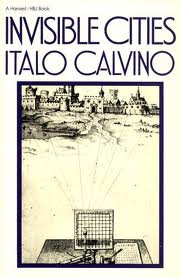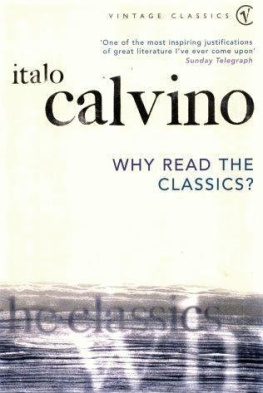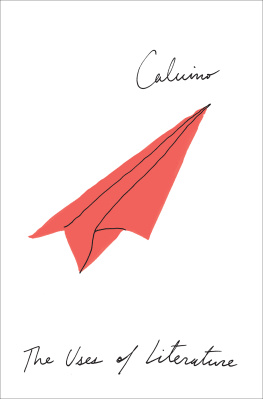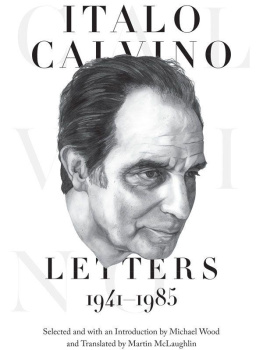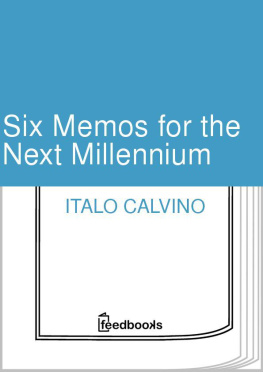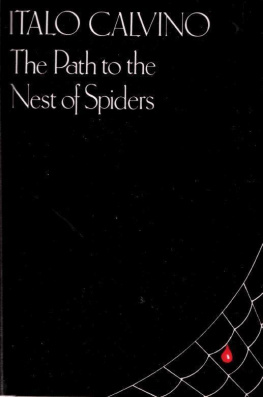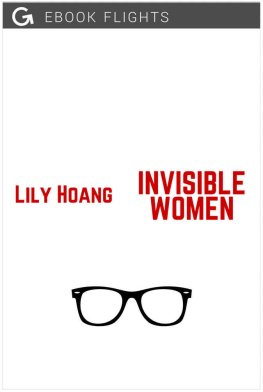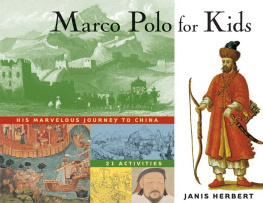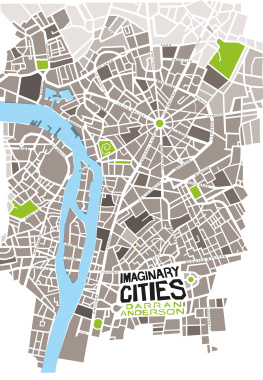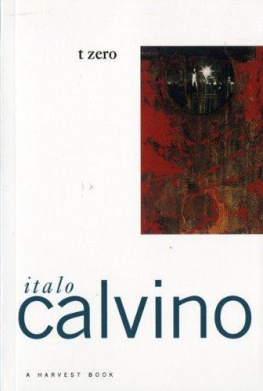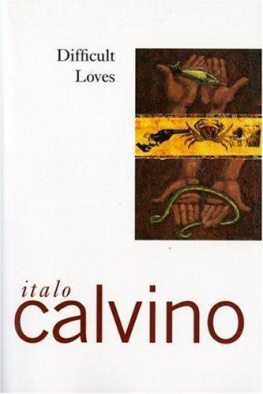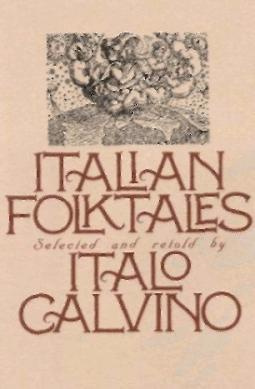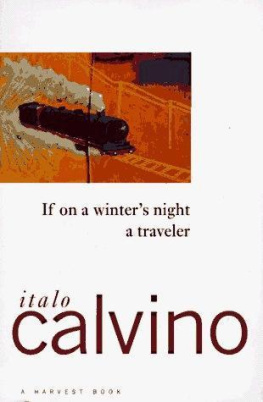Italo Calvino
Invisible Cities
First published in 1972
translated from the Italian by William Weaver
Italo Calvino was born in Cuba in 1923 and grew up in San Remo, Italy. He is an essayist and journalist as well as a novelist, and is a member of the editorial staff of the Turin publishing firm Giulio Einaudi Editore. His other novels include The Castle of Crossed Destinies_ (also published in Picador), Cosmicomics,_ and t zero._ In 1973 Italo Calvino won the prestigious Italian literary award, the Premio Feltrinelli.
10..
11 Cities and memory 1
11 Cities and memory 2
12 Cities and desire 1
13 Cities and memory 3
14 Cities and desire 2
15 Cities and signs 1
16 Cities and memory 4
17 Cities and desire 3
18 Cities and signs 2
19 Thin cities 1
20..
24..
27 Cities and memory 5
28 Cities and desire 4
29 Cities and signs 3
30 Thin cities 2
31 Trading cities 1
32..
36..
39 Cities and desire 5
40 Cities and signs 4
41 Thin cities 3
42 Trading cities 2
43 Cities and eyes 1
45..
48..
51 Cities and signs 5
52 Thin cities 4
53 Trading cities 3
54 Cities and eyes 2
54 Cities and names 1
56..
58..
61 Thin cities 5
61 Trading cities 4
62 Cities and eyes 3
63 Cities and names 2
64 Cities and the dead 1
66..
68..
71 Trading cities 5
72 Cities and eyes 4
73 Cities and names 3
74 Cities and the dead 2
76 Cities and the sky 1
78..
82..
85 Cities and eyes 5
86 Cities and names 4
88 Cities and the dead 3
89 Cities and the sky 2
91 Continuous cities 1
93..
96..
99 Cities and names 5
100 Cities and the dead 4
101 Cities and the sky 3
102 Continuous cities 2
103 Hidden cities 1
104..
106..
109 Cities and the dead 5
111 Cities and the sky 4
112 Continuous cities 3
113 Hidden cities 2
114 Cities and the sky 5
116 Continuous cities 4
117 Hidden cities 3
119 Continuous cities 5
120 Hidden cities 4
122 Hidden cities 5
124 ..
Kublai Khan does not necessarily believe everything Marco Polo says when he describes the cities visited on his expeditions, but the emperor of the Tartars does continue listening to the young Venetian with greater attention and curiosity than he shows any other messenger or explorer of his. In the lives of emperors there is a moment which follows pride in the boundless extension of the territories we have conquered, and the melancholy and relief of knowing we shall soon give up any thought of knowing and understanding them. There is a sense of emptiness that comes over us at evening, with the odour of the elephants after the rain and the sandalwood ashes growing cold in the braziers, a dizziness that makes rivers and mountains tremble on the fallow curves of the planispheres where they are portrayed, and rolls up, one after the other, the despatches announcing to us the collapse of the last enemy troops, from defeat to defeat, and flakes the wax of the seals of obscure kings who beseech our armies protection, offering in exchange annual tributes of precious metals, tanned hides, and tortoise shell. It is the desperate moment when we discover that this empire, which had seemed to us the sum of all wonders, is an endless, formless ruin, that corruptions gangrene has spread too far to be healed by our sceptre, that the triumph over enemy sovereigns has made us the heirs of their long undoing. Only in Marco Polos accounts was Kublai Khan able to discern, through the walls and towers destined to crumble, the tracery of a pattern so subtle it could escape the termites gnawing._
CITIES & MEMORY 1
Leaving there and proceeding for three days towards the east, you reach Diomira, a city with sixty silver domes, bronze statues of all the gods, streets paved with lead, a crystal theatre, a golden cock that crows each morning on a tower. All these beauties will already be familiar to the visitor, who has seen them also in other cities. But the special quality of this city for the man who arrives there on a September evening, when the days are growing shorter and the multicoloured lamps are lighted all at once at the doors of the food stalls and from a terrace a womans voice cries ooh!, is that he feels envy towards those who now believe they have once before lived an evening identical to this and who think they were happy, that time.
CITIES & MEMORY 2
When a man rides a long time through wild regions he feels the desire for a city. Finally he comes to Isidora, a city where the buildings have spiral staircases encrusted with spiral seashells, where perfect telescopes and violins are made, where the foreigner hesitating between two women always encounters a third, where cockfights degenerate into bloody brawls among the betters. He was thinking of all these things when he desired a city. Isidora, therefore, is the city of his dreams: with one difference. The dreamed-of city contained him as a young man; he arrives at Isidora in his old age. In the square there is the wall where the old men sit and watch the young go by; he is seated in a row with them. Desires are already memories.
CITIES & DESIRE 1
There are two ways of describing the city of Dorothea: you can say that four aluminium towers rise from its walls flanking seven gates with spring-operated drawbridges that span the moat whose water feeds four green canals which cross the city, dividing it into nine quarters, each with three hundred houses and seven hundred chimneys. And bearing in mind that the nubile girls of each quarter marry youths of other quarters and their parents exchange the goods that each family holds in monopolybergamot, sturgeon roe, astrolabes, amethystsyou can then work from these facts until you learn everything you wish about the city in the past, present, and future. Or else you can say, like the camel-driver who took me there: I arrived here in my first youth, one morning, many people were hurrying along the streets towards the market, the women had fine teeth and looked you straight in the eye, three soldiers on a platform played the trumpet, and all around wheels turned and coloured banners fluttered in the wind. Before then I had known only the desert and the caravan routes. In the years that followed, my eyes returned to contemplate the desert expanses and the caravan routes; but now I know this path is only one of the many that opened before me on that morning in Dorothea.
CITIES & MEMORY 3
In vain, great-hearted Kublai, shall I attempt to describe Zaira, city of high bastions. I could tell you how many steps make up the streets rising like stairways, and the degree of the arcades curves, and what kind of zinc scales cover the roofs; but I already know this would be the same as telling you nothing. The city does not consist of this, but of relationships between the measurements of its space and the events of its past: the height of a lamppost and the distance from the ground of a hanged usurpers swaying feet; the line strung from the lamppost to the railing opposite and the festoons that decorate the course of the queens nuptial procession; the height of that railing and the leap of the adulterer who climbed over it at dawn; the tilt of a guttering and a cats progress along it as he slips into the same window; the firing range of a gunboat which has suddenly appeared beyond the cape and the bomb that destroys the guttering; the rips in the fish net and the three old men seated on the dock mending nets and telling each other for the hundredth time the story of the gunboat of the usurper, who some say was the queens illegitimate son, abandoned in his swaddling clothes there on the dock.
Next page
